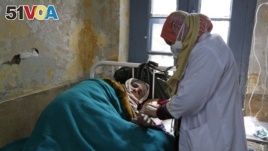Nov 26, 2016
The world is getting smaller. And as ever more people travel across continents, an infectious disease threat anywhere can be a threat everywhere. In today's interconnected world, a pathogen can travel around the globe to major cities in as little as 36 hours. This means that when a deadly disease, such as the avian flu for example, emerges from a rural location where people and animals live in close contact, it can quickly move to cities, and from there be carried around the world within hours. In densely populated areas, one or two carriers of a highly infectious disease can cause a pandemic or even an epidemic within days.
Prevention is the first line of defense against deadly diseases. To defeat potential outbreaks should they emerge, it is crucial that the world community is capable of quickly detecting, responding to and containing infectious diseases occurring anywhere in the world. This means close cooperation and communication among governments and health organizations around the world. But fragile national health systems in too many countries make this difficult, which leaves the world vulnerable to the outbreaks.

The Global Health Security Agenda is a partnership of international organizations, non-governmental stakeholders, and 55 countries, including the United States. Launched two years ago, it aims to help countries address global vulnerability to these public health threats, strengthen systems, and ensure that a trained workforce has the systems and tools needed to prevent, detect, and respond to infectious diseases.
On November 4th, President Barack Obama signed an executive order which cements the Global Health Security Agenda as a national, priority and affirms the United States' commitment to achieving the protections that Global Health Security Agenda makes possible.
“Promoting global health security is a core tenet of our national strategy for countering biological threats. No single nation can be prepared if other nations remain unprepared to counter biological threats,” states the document.
“The comprehensive framework the Obama Administration is launching with this executive order,” wrote USAID Assistant Administrator for Global Health, Dr. Ariel Pablos Mendez, “will have a far-reaching impact on our ability to partner with new sectors to prevent, detect and respond to epidemic threats; leverage the full power and leadership of the U.S. Government for this effort; and move us closer to achieving the vision of a world safe and secure from infectious disease threats.”